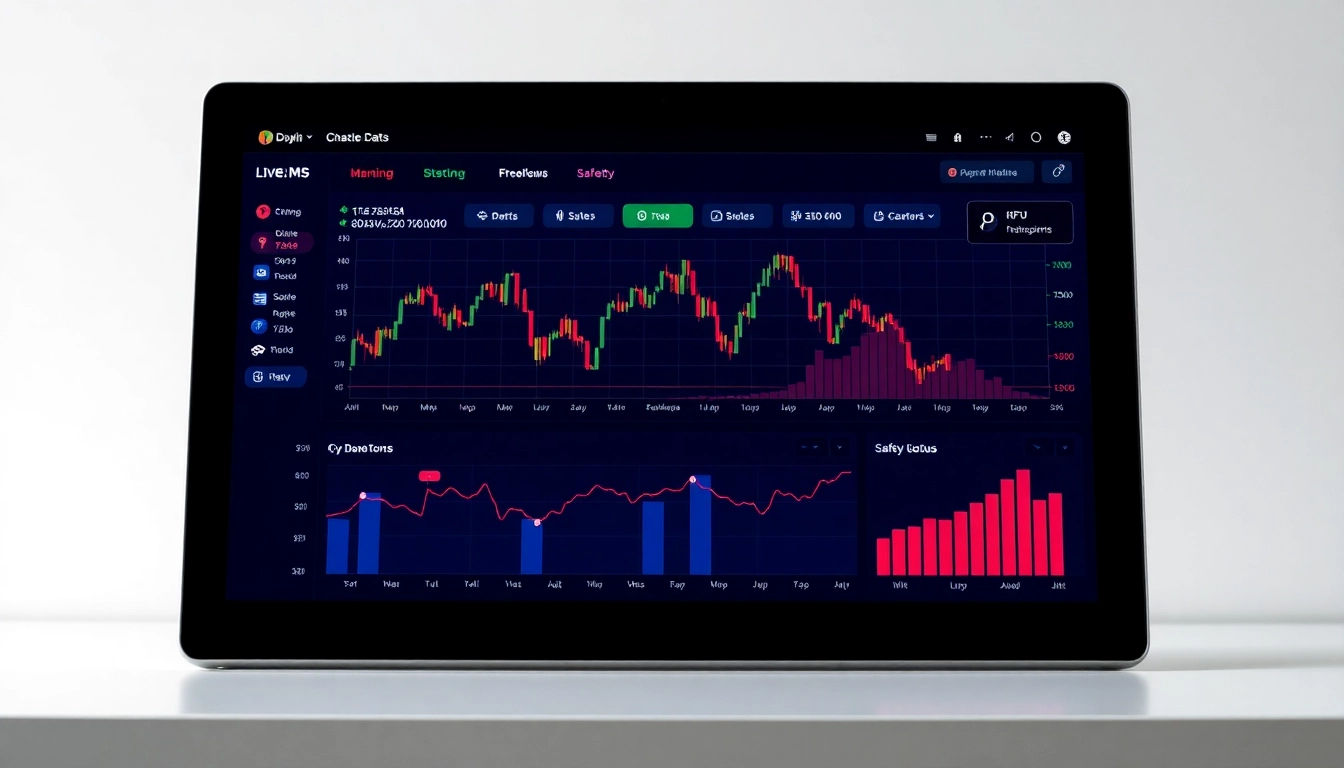Introduction to Online Stock Trading in the UK
In recent years, online stock trading has revolutionized how investors and traders engage with financial markets across the United Kingdom. With the advent of advanced trading platforms, real-time market data, and regulatory protections, individuals now have unprecedented access to a broad spectrum of investment opportunities. For those eager to build wealth, hedge risks, or diversify portfolios, understanding the landscape of Online Stock Trading UK is essential. This comprehensive guide delves into the essential aspects of online stock trading in the UK, exploring platform selection, effective strategies, market analysis, and technological tools to empower traders of all skill levels.
Understanding the UK Trading Landscape
The UK’s stock trading environment is characterized by a mature, transparent, and highly regulated marketplace primarily centered around the London Stock Exchange (LSE). As one of the world’s leading financial hubs, London provides a fertile ground for both local and international investors. The market includes a diverse array of securities such as equities, bonds, ETFs, and derivatives, with access to international exchanges through authorized platforms.
The regulatory framework is overseen by the Financial Conduct Authority (FCA), ensuring investor protection, fair trading practices, and transparency. UK traders are also influenced by global economic trends, Brexit-related shifts, and evolving regulatory standards, which shape the trading climate. Moreover, technological advances have made it possible for retail investors to execute trades with minimal capital on platforms that provide professional-grade tools, fostering a democratization of investing.
Key Benefits of Online Stock Trading
- Accessibility: Anyone with an internet connection can participate, eliminating barriers linked to traditional brokers.
- Cost-efficiency: Low commissions, no minimum deposit requirements, and zero or minimal account fees make trading affordable.
- Real-Time Data & Execution: Immediate access to market data and quick trade execution enable agility and informed decision-making.
- Educational Resources: Most platforms offer tutorials, webinars, and tools to enhance traders’ skills and knowledge.
- Flexibility & Convenience: Mobile and desktop apps allow trading from anywhere, at any time, with customizable interfaces.
Common Challenges for UK Traders
While online trading offers numerous benefits, traders face challenges such as market volatility, psychological biases, and information overload. The complexity of market movements requires traders to develop discipline and sound strategies. Regulatory changes and different tax implications can also impact returns and trading approaches. Additionally, technical issues like platform outages, cybersecurity threats, or unfamiliarity with advanced tools can hinder trading efficiency.
Overcoming these hurdles involves continuous education, robust risk management practices, and selecting reputable platforms that prioritize security and customer support.
Selecting the Best Trading Platforms in the UK
Features to Look for in UK Trading Platforms
Choosing the right platform is crucial for successful online trading. Key features include:
- User-Friendly Interface: Intuitive design for easy navigation, especially for beginners.
- Low Trading Costs: Competitive commissions, spreads, and fees.
- Comprehensive Market Data: Access to real-time quotes, analysis tools, and news feeds.
- Robust Order Types: Support for stop-loss, limit orders, and advanced trade execution options.
- Research & Educational Resources: Built-in analysis tools, tutorials, and market insights.
- Security & Regulation: FCA authorization, encryption, and transparent privacy policies.
- Customer Support: Responsive assistance via multiple channels.
- Mobile and Desktop Compatibility: Seamless trading across different devices.
Popular UK platforms like Interactive Brokers, Trading 212, Freetrade, and Degiro exemplify these features, each catering to different trader profiles.
Comparison of Top UK Trading Platforms for Beginners and Professionals
For newcomers, platforms such as Trading 212 and Freetrade offer commission-free trading, fractional shares, and simplified interfaces. Trading 212, for example, provides an accessible entry point with extensive educational content. Conversely, professional traders often prefer platforms like Interactive Brokers, which provide advanced analytics, diverse asset classes, and sophisticated order types. Degiro appeals to cost-conscious investors due to its low commissions while maintaining high execution standards.
The choice depends on your investment goals, experience level, and required features. Beginners should prioritize ease of use, while experienced traders should seek advanced tools and broader market access.
How to Choose a Platform that Fits Your Trading Style
Your trading style—whether active, passive, short-term, or long-term—dictates platform selection. Active traders benefit from platforms with high-speed execution, customizable charts, and API integrations. Long-term investors might prefer platforms with comprehensive research tools, retirement account options, and minimal trading fees.
Conducting trial runs with demo accounts, assessing fee structures, and consulting user reviews can inform your decision. Remember, the best platform aligns with your trading frequency, asset preferences, and risk appetite.
Strategies and Techniques for Successful Stock Trading in the UK
Fundamental vs. Technical Analysis for UK Stocks
Fundamental analysis involves evaluating company financials, earnings reports, industry position, and macroeconomic factors to determine intrinsic value. In the UK, this might include assessing Brexit impacts, sector growth prospects, or dividends from FTSE-listed companies. Tech analysis, on the other hand, uses price patterns, volume, moving averages, and indicators like RSI or MACD to forecast short-term price movements.
Combining both approaches—using fundamentals to identify long-term investment opportunities and technicals for entry/exit timing—can optimize trading outcomes.
Risk Management Tips Tailored for UK Markets
Managing risk is paramount. Set stop-loss and take-profit levels to limit potential losses and lock in gains. Diversify across sectors like finance, healthcare, and technology to reduce exposure to sector-specific downturns. Keep leverage minimal, especially in volatile UK markets influenced by political and economic shifts. Regularly review and adjust your trading plan based on market conditions and personal financial goals.
Maintaining emotional discipline and avoiding impulsive decisions are equally vital in preserving capital.
Developing a Trading Plan for Consistent Results
A comprehensive trading plan defines your objectives, risk tolerance, preferred assets, and strategies. Include entry and exit criteria, position sizing rules, and routine performance reviews. Backtest your strategies using historical data to evaluate effectiveness. Consistency, discipline, and continuous education drive long-term success. Consider journaling trades to analyze mistakes and refine tactics over time.
Market Analysis and Investment Opportunities in the UK
Understanding UK Stock Market Indicators
Key indicators such as the FTSE 100 index, sector indices, and economic reports inform market direction. The FTSE 100, representing the largest UK companies, serves as a barometer of economic health. Investors also monitor PMI reports, inflation rates, and political developments like Brexit negotiations, which can cause volatility. Utilizing economic calendars and market sentiment analysis helps traders anticipate movements and make timely decisions.
Emerging Sectors and Growth Stocks in the UK
Sectors such as renewable energy, technology, and healthcare are experiencing significant growth. Companies involved in green technology, biotech innovations, and digital services present promising opportunities. For example, UK-based clean energy firms or biotech research labs could outperform traditional sectors amid evolving market demands. Maintaining awareness of government policies, subsidies, and international collaborations can aid in identifying lucrative stocks.
Using Global and Local News to Inform Trades
News events—from Brexit updates and trade negotiations to monetary policy decisions—can cause sharp market swings. Incorporate real-time news feeds and analysis tools into your trading routine. Social media and financial news outlets provide timely insights, but always cross-verify information to avoid misinformation. Developing an effective protocol for reacting to news can safeguard investments and capitalize on emerging trends.
Leveraging Technology and Tools for Online Stock Trading UK
Advanced Trading Tools and Automation
Modern platforms integrate algorithmic trading, real-time analytics, and customizable dashboards. Automated trading bots can execute strategies based on predefined criteria, reducing emotional biases. Backtesting tools allow traders to evaluate strategies against historical data. AI-driven insights can assist in predicting market moves, especially during volatile periods impacted by UK economic policies.
Mobile Trading Apps and Their Features
Mobile apps have become fundamental to active trading. Features like push notifications, biometric security, and responsive design enable traders to act swiftly. Real-time quotes, charting tools, and quick order execution are standard. Choosing apps with reliable connectivity and integrated research resources ensures that traders stay productive and well-informed on the go.
Staying Compliant with UK Trading Regulations and Best Practices
Compliance with FCA regulations involves adhering to anti-money laundering standards, reporting requirements, and trading best practices. Maintaining accurate records, understanding tax obligations, and implementing strict security measures protect both traders and their assets. Regularly updating your knowledge of regulatory changes and platform security features maintains a compliant and secure trading environment.



